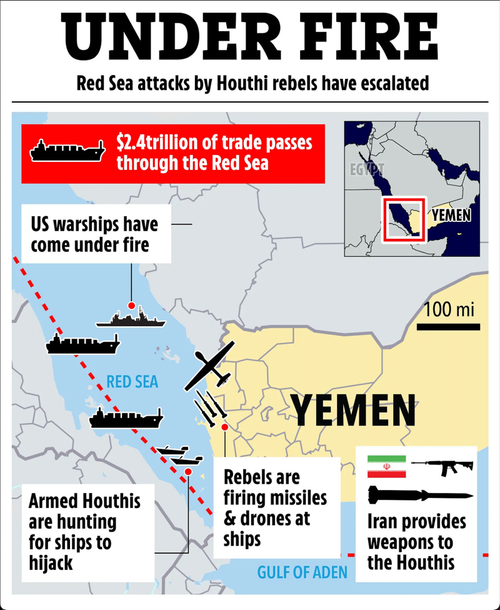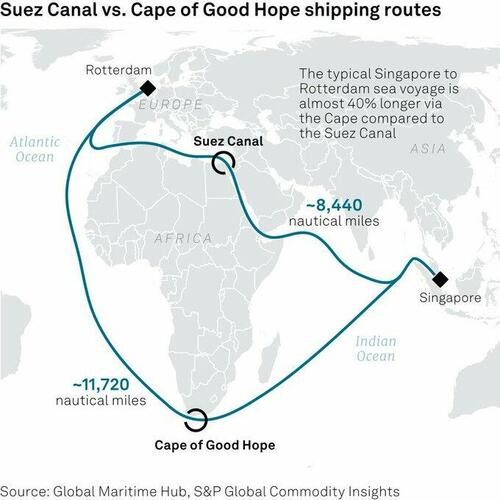by Brian Shilhavy
Editor, Health Impact News
There can be no doubt now that we are in the beginning phase of WW III, as a full-blown Naval War has broken out in the Red Sea that threatens global trade.
Here are some recent news reports explaining how dire the situation has become:
Add Taiwanese container shipping line Evergreen and Belgian tanker owner Euronav to the growing list of major shipping firms halting all sails through the Red Sea strait. This brings the total to seven.
Also, the UK Navy disclosed more details regarding today’s incident in the Red Sea, reporting that an explosion hit the side of a commercial vessel near Yemen. The Norwegian owner of the ship confirmed that an “unidentified object” had impacted the vessel on the port side.
Bloomberg reports:
- YEMEN HOUTHIS SAY THEY ATTACKEDMSC CLARA CONTAINER SHIP
- YEMEN HOUTHIS CLAIM THEY ALSO ATTACKED SWAN ATLANTIC OIL TANKER
Between 10% and 12% of global trade passes through the Red Sea each year.
Red Sea is now largely closed to traffic. That's 8.8 million bpd of daily oil transit, and nearly 380 million tons of daily cargo transit.
Global traffic now will be rerouted around Cape of Good Hope, adding 40% to voyage distance (and even more to cost) pic.twitter.com/Xct7x03tFI
— zerohedge (@zerohedge) December 18, 2023
And it begins.
Suez update: 46 container ships now have diverted around the Cape of Good Hope rather than transiting the Red Sea. pic.twitter.com/4zaTXn3LO1
— Ryan Petersen (@typesfast) December 18, 2023
All the chaos in the Red Sea has forced London maritime insurers to expand war risk coverage to the area.
The number of major shipping firms halting all commercial sailings through the highly trafficked Red Sea strait has increased to five from four in response to missile and drone attacks by Yemen’s Iran-backed Houthis.
Bloomberg reports that energy giant BP Plc is the latest shipper to pause all tanker sailings through the strategic Bab al-Mandab strait due to Houthi militants.
“In light of the deteriorating security situation for shipping in the Red Sea, BP has decided to temporarily pause all transits through the Red Sea,” BP said in a statement.
Besides BP, Maersk, Hapag-Lloyd, CMA CGM, and Mediterranean Shipping Company have all paused commercial vessel operations through the Red Sea that connects to Egypt’s Suez Canal.
Spillover risks of the Israel-Hamas war are quickly building, as the Red Sea is responsible for 10% of the world’s international trade.
Over the weekend, US Central Command wrote in a post on X that the Burke-class guided-missile destroyer USS Carney shot down 14 Houthi drones in the Red Sea.
On Monday morning, the UK Navy said it received a report of a possible explosion on the water about 30 miles south of Port Mokha, Yemen.
The chaos has caused some shippers to divert vessels around the Cape of Good Hope to avoid the conflict area.
Read the full article on ZeroHedge.com.
Pentagon Launches “Operation Prosperity Guardian”

Long-range ballistic missiles in Yemen. Source.
It was announced today that the United States was launching “Operation Prosperity Guardian”, a new military operation in the Red Sea.
‘Operation Prosperity Guardian’ – Pentagon To Launch Expansive Naval Coalition To Defend Red Sea Passage
A US-led naval coalition is finally coming together to protect international shipping transit in the Red Sea and vital Bab al-Mandab Strait, per a breaking development from Politico’s chief Pentagon correspondent: “The Pentagon is expected to announce tomorrow the formation of Operation Prosperity Guardian, a new task force to protect shipping from Houthi attacks in the Bab Al-Mandeb Strait and Red Sea, per DOD official,” writes Lara Seligman on X.
“The operation will be within the framework of the existing Combined Maritime Force 153, a partnership of 39 nations focused on counter piracy and counter terrorism in the Red Sea.”
Days ago it was reported that the Pentagon was looking to cobble together the ‘broadest possible’ coalition task force, amid what’s now become daily Iran-backed Houthi attacks on commercial vessels. The Houthis have also launched rockets and drones into southern Israel at various times, triggering US warship intercepts.
Just hours ago, we reminded readers of Zoltan Poszar’s prediction of central-bank-analogized ‘military protection’ and said it’s soon to become a reality… and just like that, it has:
Protection is a conceptual counterpart to par. When you decide to take money out of a sight deposit, you expect the same amount back that you put in (par).
When you sail foreign cargo from port A to port B, you expect to unload the same amount of cargo that you onloaded.
Banks can deliver par on deposits most of the time. When not, central banks step in to help.
Commodity traders can deliver foreign cargo from port A to port B most of the time, but when not, the state intervenes again: not the monetary arm, but the military arm of the state.
What central banks are to the protection of par promises, the military branch is to the protection of shipments: foreign cargo needs to sail on sea routes and through choke points like the Strait of Hormuz, and “par” in this context means being able to sail from here to there freely, safely, and without undue delays…
It has also emerged that Australia is expected to play a major role in Red Sea operations in the context of deepening ties with the US related to the AUKUS deal.
U.S. warships currently operating in the Red Sea https://t.co/iUnBov1hkR pic.twitter.com/bqNwlDq18M
— Financelot (@FinanceLancelot) December 18, 2023
Rabobank explains in the following…
Australia is reportedly in talks with the Pentagon over a US request to send an Australian warship to the Red Sea to assist in dealing with Iran-backed Houthi rebels, who have been disrupting commercial shipping in the region and launching missile and drone strikes against US targets and their allies. This request comes just days after Congress passed laws enabling the sale of Virginia class submarines to Australia under the terms of the AUKUS pact.
The agreement marks just the second time that the United States has shared nuclear secrets with another country (on purpose, at least), so it appears that there is an element of “I scratch your back, you scratch mine” going on here. This is not without its complications, as many members of Australia’s political establishment (particularly within the ruling Labor Party) still cling to dreams of ‘strategic autonomy’ of the kind that doesn’t even work for Europe.
Their fear is that AUKUS, and an Australian warship shooting down drones in the Red Sea, further locks Australia in as an organ of US foreign policy, which it probably does. But really, this is par for the course and probably just the modern incarnation of Australia’s long-running policy of having ‘great and powerful friends’. Quite aside from the diplomatic horse-trading that accompanies it, disruption of shipping in the Red Sea is a big problem, and Europe has the most to lose. 150 years of supply chain improvement risks being unwound as major shipping companies redirect vessels around the Cape of Good Hope to avoid traversing the region to pass through the Suez Canal into the Mediterranean. (Full article.)
Are the U.S. Media Failing to Report All the Current Cyber Attacks Happening?
There are many reports of Cyber Attacks in the news right now, with the latest one being reported as an Israeli cyber attack against Iran that took down their petroleum distribution system earlier today.
Iran points at Israeli-linked group as cyberattack disrupts fuel network
Tehran says Israel-linked Predatory Sparrow group is behind the disruption.
A cyberattack has disrupted services at around 70 percent of Iran’s fuel stations, according to reports.
The Israel-linked group Predatory Sparrow, or Gonjeshke Darande in Persian, claimed on Monday it was behind the disruption, according to Iranian state TV. Israel media outlets also reported the claim.
The fuel outages are the first such incident since 2021, when a major cyberattack in Iran disrupted the sale of fuel, causing long queues at stations across the country.
Pump prices in Iran are heavily subsidised. Iran accused Israel and the United States of being behind those attacks. (Full article.)
Here are some other reported cyber attacks that have occurred during the past few days:
Defense Contractor Austal USA Confirms a Cyber Attack by Hunters International Ransomware Group
Australian-based American defense contractor Austal USA has confirmed a cyber attack after the Hunters International ransomware group listed the company and shared samples of the stolen data as proof.
Austal USA is a Contractor for the US Department of Defense (DOD) and the Department of Homeland Security (DHS), undertaking major U.S. Navy shipbuilding programs.
With five shipyards in four countries and a workforce of 4,300, Austal produces various sea vessels, including offshore patrol cutters, landing craft, floating docks, combat ships, autonomous boats, and submarine components. The company reported $1.585 billion after delivering nine ships in 2023, with another 40 scheduled or under construction.
The Hunters International ransomware group has threatened to leak 43 files containing 87.2MB of sensitive data from the American shipbuilder. (Full article.)
Ukraine’s biggest mobile operator Kyivstar may need several weeks to reinstate all its services after a massive cyber attack
Ukraine’s biggest mobile operator Kyivstar may need several weeks to reinstate all its services after a massive cyber attack, though major services could be restored by the end of this week, the company’s CEO Oleksandr Komarov said on Thursday.
Tuesday’s attack on Kyivstar, which counts more than half of Ukraine’s population as mobile subscribers, knocked out services and damaged IT infrastructure and air raid alert systems in several regions.
Komarov said he hoped the company would be able to fully restore three major services – mobile internet, voice services, and SMS – by the end of this week.
“(To restore) all additional services, from my point of view, will probably take several weeks,” he said in televised comments. (Full article.)
Cyber-attack closes hospital emergency rooms in three US states
Cyber-attack closes hospital emergency rooms in three US states
Ardent Health, which oversees hospitals in states including Texas, New Mexico and Oklahoma said it was targeted over Thanksgiving
A cyber-attack has shut down emergency rooms in at least three states, a hospital operator warned on Monday, forcing the organization to divert patients to other facilities.
Ardent Health, which oversees 30 hospitals in states across the US, including New Mexico, Texas and Oklahoma, said it had been targeted by a ransomware attack over the Thanksgiving holiday. The attack had shut down a significant number of its computerized services, the company said in a news release. (Full article.)
Many people unaware that they lost personal data in cyber attacks: Rubrik CEO
Businesses need to have a new strategy around cyber resilience which assumes that attacks will happen.
At least one in three people around the world have lost their personal data in a cyber attack and they are not even aware of it, claimed a survey of more than 1,600 companies from the industry.
IT and security related decision makers at companies of 500 or more employees participated in the survey conducted by Wakefield Research on behalf of cyber security firm Rubrik.
”The world over collectively cyber industry is earning collectively USD 200 billion in a year and what is kind of depressing is, as per our Rubrik Zero Lab report that one in three people around the world have lost their personal data in a cyber attack and they don’t even know about it,” Sinha told PTI.
According to the report, over half (53 per cent) of external organizations surveyed experienced a material loss of sensitive information in the last year, with about one out of every six organizations (16 per cent) experiencing multiple losses in 2022. (Full article.)
While you can find these stories on cyber attacks by doing a news search, they are not (yet) headline news, and one has to wonder why not, and are these cyber attacks happening a lot more than what is being reported?
Most likely.
The U.S. Department of Justice (DOJ) just gave permission to Corporate America to NOT report cyber attacks for at least 30 days, due to “national security.”
DOJ says companies can delay revealing cyber attacks when national security is at stake
The Justice Department said Wednesday it will weigh how quickly publicly traded companies have to disclose cyber attacks to their shareholders and the public, a decision with big implications for both national security and the stock market.
The announcement came in response to new rules from the Securities and Exchange Commission requiring companies to report cyber attacks that threaten a significant change in their bottom line. The rule requires disclosure of the scope and timing of the cyber incident, and the impact on the company’s financial condition and operations.
But the SEC rule included an exception: companies aren’t required to reveal cyber attacks when the attorney general determines that disclosure might hurt public safety or national security. (Full article.)
Are You Prepared?
Are you prepared for a cyber attack? What will you do when you have no power, and no Internet?
If you don’t know, now is the time to think about it and prepare accordingly.
Comment on this article at HealthImpactNews.com.

See Also:
Understand the Times We are Currently Living Through
Exposing the Christian Zionism Cult
Jesus Would be Labeled as “Antisemitic” Today Because He Attacked the Jews and Warned His Followers About Their Evil Ways
Insider Exposes Freemasonry as the World’s Oldest Secret Religion and the Luciferian Plans for The New World Order

Identifying the Luciferian Globalists Implementing the New World Order – Who are the “Jews”?
Who are the Children of Abraham?
The Brain Myth: Your Intellect and Thoughts Originate in Your Heart, Not Your Brain
Fact Check: “Christianity” and the Christian Religion is NOT Found in the Bible – The Person Jesus Christ Is
Young Man Living on the Streets Finds Jesus of the Bible – Overcomes Drug and “Terminally Online” Addictions
COVID “Vaccine” Injured Muslim Man Learns COVID was a Scam and Meets Jesus of the Bible as he Begins to Heal
Was the U.S. Constitution Written to Protect “We the People” or “We the Globalists”? Were the Founding Fathers Godly Men or Servants of Satan?
The Seal and Mark of God is Far More Important than the “Mark of the Beast” – Are You Prepared for What’s Coming?
The United States and The Beast: A look at Revelation in Light of Current Events Since 2020
The Satanic Roots to Modern Medicine – The Mark of the Beast?
Medicine: Idolatry in the Twenty First Century – 8-Year-Old Article More Relevant Today than the Day it was Written
Having problems receiving our emails? See:
How to Beat Internet Censorship and Create Your Own Newsfeed
We Are Now on Telegram. Video channels at Bitchute, and Odysee.
If our website is seized and shut down, find us on Telegram, as well as Bitchute and Odysee for further instructions about where to find us.
If you use the TOR Onion browser, here are the links and corresponding URLs to use in the TOR browser to find us on the Dark Web: Health Impact News, Vaccine Impact, Medical Kidnap, Created4Health, CoconutOil.com.






















